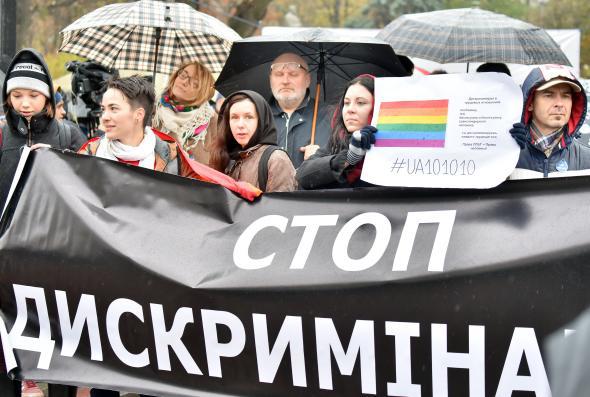2015 included some remarkable victories for LGBTQ rights in Europe—remarkable precisely because they were exceptional in a year when it became ever clearer how different the queer experience can be across the continent.
Malta was ranked as the most progressive country in Europe in terms of respecting the human rights and full equality of LGBTQ people, according to the new edition of the Rainbow Europe report compiled by ILGA-Europe, a nongovernmental umbrella group that covers more than 400 LGBTQ organizations from 45 European countries. In 2015, Malta adopted “groundbreaking legislation” and “comprehensive public policies” on LGBTQ rights, including the rights of transgender and intersex individuals, becoming the first country in the world to prohibit “unnecessary surgical procedure on the sex characteristics of a person without their consent.”
The LGBTQ rights movement also achieved a famous triumph in Ireland, where voters gave their whole-hearted support to marriage equality in a landmark referendum. “Ireland shook off its mantle as a socially conservative state,” the report states. At the European Court of Human Rights, judges ruled in favor of three same-sex couples from Italy, declaring that failing to make available “a specific legal framework providing for the recognition and protection of same-sex unions” is a violation of human rights. As of February 2016, a civil unions bill was making its way through the Italian legislative process.
ILGA-Europe suggests that 2015 could also be termed the “year of the reminder,” because “several times we were prompted to recognize that the news headlines Ireland and Malta inevitably attracted often masked the more complex situation across many parts of Europe.” Indeed, while a referendum brought about marriage equality in Ireland, the very same instrument of democracy narrowed the definition of a union in Slovakia and Armenia. Achieving equality in one country, or one aspect of law such as marriage or workplace discrimination, ILGA-Europe states, “does not signal the end of our advocacy journey.”
The picture that emerges from the latest Rainbow Europe report is of a two-speed Europe, divided between countries heading in the direction of greater equality and those standing still or indeed deliberately implementing measures that cause obvious harm to LGBTQ people. Malta leads the way on LGBTQ rights, along with Belgium and the United Kingdom, Denmark, Spain, and Portugal. The list of regressive nations is lead by Azerbaijan and includes Russia—how could it not?—Armenia, Turkey, Ukraine, and Belarus.
The difference could not be starker. In Azerbaijan, numerous violent attacks against LGBTQ individuals were reported in 2015, including a trans person stabbed in the throat near a metro station in Baku, the capital, in November. Istanbul’s Pride celebration was marred by violent disruption for the first time in 12 years, when police outlawed the demonstration and turned tear gas, water cannons, and rubber bullets on Turkey’s LGBTQ activists and allies. A law that would forbid telling children anything that discredits the “institution of family”—modeled on Russia’s “homosexual propaganda” law—is due for a second reading in Belarus’ House of Representatives.
When last year’s Rainbow Europe report was released, I wrote that “an Iron Curtain continues to divide Europe when it comes to LGBTQ rights,” it separates West from East and those under the influence of the European Union from the gravitational pull of Russia’s orbit. While there are exceptions to the rule—Croatia being the most obvious example (although social acceptance of LGBTQ people lags behind their acceptance under the law)—they are indeed out of the ordinary. Not enough has changed since 2014 to alter these East-West, EU-Russia paradigms on LGBTQ rights.
Joyce Hamilton, the co-chair of ILGA-Europe’s executive board, called this year’s report a “wake-up call,” arguing that it reminds activists “that our work is far from over.” More than that, the report clearly demonstrates the importance of activism as a tool for social change. Malta and Ireland were testament, ILGA-Europe argues in its report, to “the tangible power of civil society mobilization combined with political leadership.” Hope springs from the fact that “profound political and social change really is possible.”
Although the U.S. State Department, through its network of embassies, supports the work of LGBTQ rights organizations in some European countries, it is evident that American NGOs could do more to aid the struggle for dignity and equality in Europe. The Human Rights Campaign, for example, is the largest LGBTQ rights group in the United States, and it purports to “envision a world where lesbian, gay, bisexual and transgender people are embraced as full members of society at home, at work and in every community.”
Sadly, that world doesn’t seem to extend far beyond America’s borders. It is unclear what the HRC’s vague commitment to “working to achieve equal rights for all people in all places” actually means in practice, beyond producing glossy brochures for its donors. HRC partnered with the YES Equality campaign during the Irish referendum, but an organization with the clout, resources, and know-how of the HRC could do a lot more to support LGBTQ rights organizations on the ground in Europe beyond the highly marketable fight for marriage equality.
Right now, outside of Russia, the hard work European LGBTQ advocacy groups are doing under difficult conditions feels forgotten. Even inside the European Union, LGBTQ communities in Latvia, Lithuania, and Poland could do with the HRC’s help. While acknowledging that the HRC has battles to fight at home—whether it be in North Carolina or Mississippi—it is nevertheless imperative that U.S. organizations invest more attention and resources to these fights for the sake of international solidarity.
